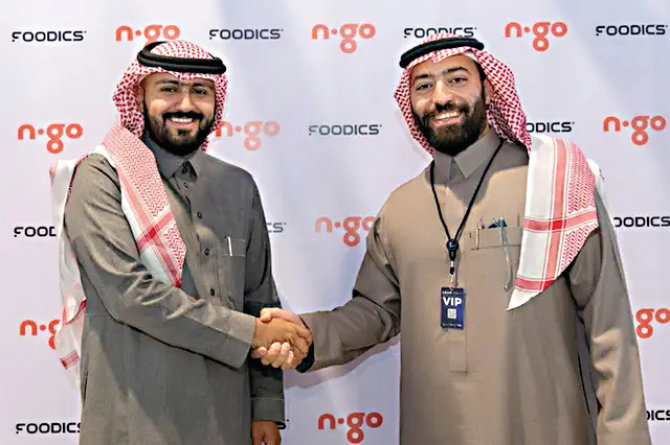CAIRO: Saudi-based leading restaurant technology and payments platform Foodics has partnered with SEA Ventures, a Saudi Arabian startup accelerator, to digitally empower entrepreneurs in the food and beverage sector.
The partnership will aim to provide startups with technical solutions to enhance the quality of emerging projects and support services to boost the entrepreneurship landscape in the Kingdom.
The agreement aligns with Vision 2030’s goals to increase the percentage of small and medium enterprises to support local content and contribution to the Kingdom’s economy.
“The F&B sector is one of the most dynamic sectors requiring the continuous introduction of innovative concepts, which can be complex to embrace at a restaurant or cafe level,” Suhail Jaber, general manager, Saudi Arabia, Foodics, said.
The signing took place in the presence of the founder and CEO of Sea Ventures, Abdul Salam Al Kuwaiti, and Jaber, at the SEA Ventures headquarters in the CITY Hub co-working space in Riyadh.
Foodics also signed a strategic agreement with virtual drive-through startup n.go to open a new sales channel to drive convenience for customers from both companies.
The partnership will enable Foodics’s clients to use the n.go app, helping restaurants and cafes increase their revenues further by offering them new sales channels from virtual drive through and curb-side pickup sales.
“As we thrive to become the one-stop-shop platform for restaurant owners to grow their operations effortlessly, it is important to continually seek innovative solutions for our clients,” Ahmad Al Zaini, co-founder and CEO of Foodics, commented on the signing.
The n.go platform allows customers to shorten waiting time and avoid long periods of standing to buy and pay in addition to allowing restaurants to eradicate manual work, reduce operational tasks and fully eliminate errors from manually pushing orders through the system.
Foodics is officially recognized by the Saudi Central Bank as a fintech company. Since its inception in 2014, it has processed over 6 billion orders through its platform and raised $170 million in its series C funding round last year.
Telgani closes $6m series A round
Saudi-based transportation and car rental startup Telgani raised $6 million in a series A funding round co-led by Hala Auto and Elm Co.
Founded in 2019, the company plans to utilize its funding to expand its short-term car rental services in the Kingdom in addition to offering more solutions for car subscriptions.
“This step comes in line with Elm’s ambitious strategy to expand its investor base and provide all necessary support to startups and SMEs thereby enhancing its role in the entrepreneurship ecosystem and driving innovation in Saudi Arabia,” Majid Al-Arifi, deputy CEO of marketing at Elm Co., said.
Hala acquires Paymennt.com
Saudi-based fintech startup Hala acquired Emirati payment solution Paymennt.com to further enhance its product offerings by incorporating online payments.
This marks Hala’s second acquisition; it previously acquired Fresh in 2021, now called Hala cashier, which currently enables it to integrate non-financial added value services to its SME customers.
The acquisition of Paymennt.com will enable SMEs to increase their online presence and process offline and online payments.

Foodics also signed a strategic agreement with virtual drive-through startup n.go to open a new sales channel to drive convenience for customers. (Supplied)
“We believe integrating the offering of Paymennt.com with that of Hala will provide a significant added value for our Saudi and UAE customers,” Maher Loubieh, co-founder of Hala, said.
Founded in 2017, Hala empowers SMEs to start, run and grow their businesses by providing them with financial and technological solutions to further boost operations.
Syrve expands to Egypt
Dubai-based restaurant management startup Syrve opened a new branch in Egypt as part of its expansion strategy in the Middle East and North Africa region.
Since its inception in 2018, Syrve has provided its all-in-one point of sale solution to over 6,000 customers with presence in 54 countries.
“Along with the tech itself, we are planning on applying our experience in the restaurant business and introducing the best practices, implementation procedures and training protocols,” Alexander Ponomarev, Syrve’s CEO, said.
The company is planning to expand innovative foodtech solutions for restaurant automation throughout the country by focusing on middle- to high-segmented customers as well as fine dining restaurants.
Tabby halts voperations in Egypt
Tabby, the UAE-based buy now, pay later startup, has shut down its operations in Egypt five months after launching its service in the country, according to Wamda.
The decision came in response to Egypt’s tight macroeconomic conditions, as it grapples with the economic fallout from a depreciating currency and subsequent high inflation rates. Since March of last year, the Egyptian pound has lost 53 percent of its value.
“Our company continues to believe in the potential of the market in Egypt. In a short period of time, we have seen very strong adoption of our products and services with some great merchant partners,” said Hosam Arab, founder and CEO of Tabby.
He added: “However, as with any business, we must prioritize projects that align with our long-term goals in core markets and, as a result, we have decided to pause our commercial operations in the Egyptian market.”
Arab added that the company would shift its focus towards sustaining its growth in its core markets including the UAE, Saudi Arabia, Bahrain and Kuwait.
“We remain optimistic about the future of the Egyptian market and will continue to assess opportunities to re-engage in the future. We will continue to invest in growing our team on the ground, who will refocus on supporting our core markets,” he explained.
Last month, Tabby raised $58 million in Series C funding from Sequoia Capital India, STV and PayPal Ventures, bringing the company’s post-funding valuation to $600 million.














